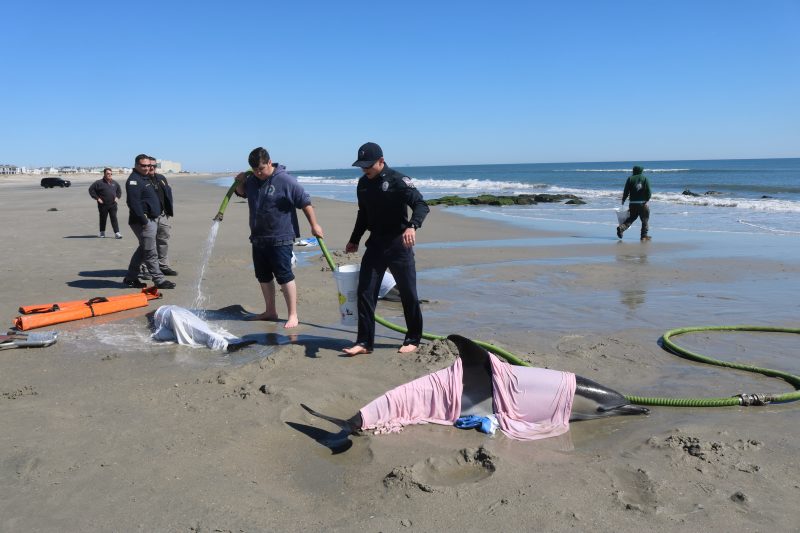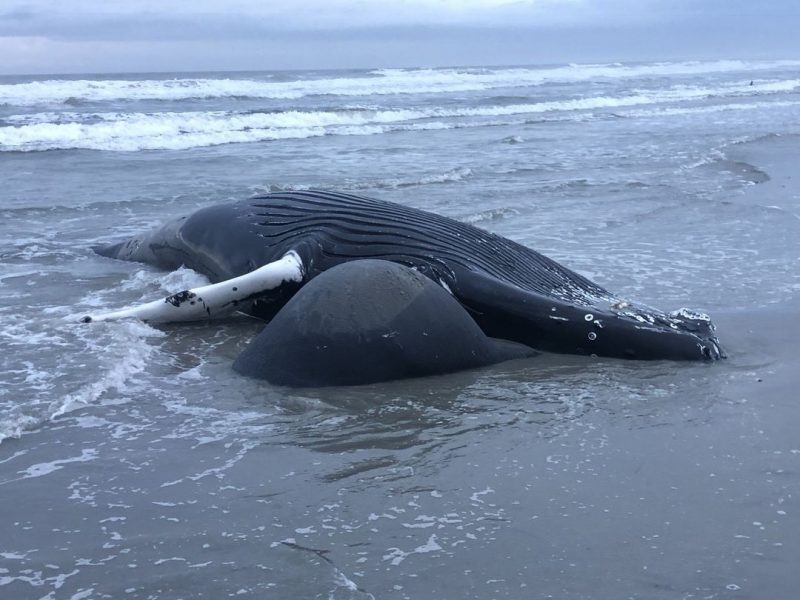First responders spray seawater on the beached dolphins in Sea Isle City in an effort to keep them alive.
 By DONALD WITTKOWSKI
U.S. Rep. Jeff Van Drew is renewing his demand for a moratorium on offshore wind energy projects following the deaths of eight dolphins that washed up on the beach Tuesday in Sea Isle City.
Van Drew, whose congressional district includes the shore communities in Atlantic and Cape May counties, wants the federal government to halt activity on the wind farms until an investigation is done to determine if the projects are causing a series of whale and dolphin deaths along the East Coast.
“It is irresponsible for federal agencies to continually tell the public that there is no connection whatsoever between offshore wind surveying and these tragic marine mammal deaths without providing actual evidence and facts backing up the assertion,” he said in a statement Wednesday.
Van Drew introduced a congressional resolution Tuesday that would stop the National Oceanic and Atmospheric Administration (NOAA) and the Bureau of Ocean Energy Management (BOEM) from approving offshore wind farm projects until an investigation is completed of the whale and dolphin deaths.
“We are not even in the construction stage of these industrial wind turbine grids, yet we are already witnessing a highly unusual mortality rate of these intelligent marine animals,” he said.
Van Drew, a Republican, said he was initially labeled a “conspiracy theorist” when he began to question whether there was a possible connection between the wind farm projects and the dead whales.
“Now, three months later, there are over 20 whales that have washed ashore on the East Coast, and just yesterday eight dolphins washed up in the same concentrated area,” he said in his statement.
Since December, 29 whales have washed up dead along the East Coast, including nine in New Jersey. While most of the attention has been focused on the whale deaths, New Jersey has also had a number of dolphins become stranded on the beach.
The mass stranding of eight dolphins on Tuesday in Sea Isle City was the largest number to date. Two of the dolphins died on the beach, while six others were euthanized later after a veterinarian from the Marine Mammal Stranding Center in Brigantine determined that their condition had deteriorated.
“The decision was made to humanely euthanize the dolphins to prevent further suffering, as returning them to the ocean would have only prolonged their inevitable death,” the center said in a statement.
The remains of the dolphins were transported to a New Jersey laboratory to determine the cause of death.
By DONALD WITTKOWSKI
U.S. Rep. Jeff Van Drew is renewing his demand for a moratorium on offshore wind energy projects following the deaths of eight dolphins that washed up on the beach Tuesday in Sea Isle City.
Van Drew, whose congressional district includes the shore communities in Atlantic and Cape May counties, wants the federal government to halt activity on the wind farms until an investigation is done to determine if the projects are causing a series of whale and dolphin deaths along the East Coast.
“It is irresponsible for federal agencies to continually tell the public that there is no connection whatsoever between offshore wind surveying and these tragic marine mammal deaths without providing actual evidence and facts backing up the assertion,” he said in a statement Wednesday.
Van Drew introduced a congressional resolution Tuesday that would stop the National Oceanic and Atmospheric Administration (NOAA) and the Bureau of Ocean Energy Management (BOEM) from approving offshore wind farm projects until an investigation is completed of the whale and dolphin deaths.
“We are not even in the construction stage of these industrial wind turbine grids, yet we are already witnessing a highly unusual mortality rate of these intelligent marine animals,” he said.
Van Drew, a Republican, said he was initially labeled a “conspiracy theorist” when he began to question whether there was a possible connection between the wind farm projects and the dead whales.
“Now, three months later, there are over 20 whales that have washed ashore on the East Coast, and just yesterday eight dolphins washed up in the same concentrated area,” he said in his statement.
Since December, 29 whales have washed up dead along the East Coast, including nine in New Jersey. While most of the attention has been focused on the whale deaths, New Jersey has also had a number of dolphins become stranded on the beach.
The mass stranding of eight dolphins on Tuesday in Sea Isle City was the largest number to date. Two of the dolphins died on the beach, while six others were euthanized later after a veterinarian from the Marine Mammal Stranding Center in Brigantine determined that their condition had deteriorated.
“The decision was made to humanely euthanize the dolphins to prevent further suffering, as returning them to the ocean would have only prolonged their inevitable death,” the center said in a statement.
The remains of the dolphins were transported to a New Jersey laboratory to determine the cause of death.
 Congressman Jeff Van Drew waves to the audience during a March 16 congressional hearing on the possible negative impacts of wind farms.
Van Drew said the dolphin and whale deaths underscore the need for an investigation to find out whether wind farm activity could be killing the mammals.
“The numbers of deaths we are witnessing are staggering, and the concentration of where the animals have washed up raises serious and legitimate questions as to what role offshore wind surveying may be doing to the hearing of these mammals,” he said.
Van Drew said NOAA and BOEM have approved “these massive construction projects” right in the middle of the mammals’ feeding and breeding grounds and migratory routes.
“NOAA and BOEM cannot keep hiding behind the response that the public just needs to ‘trust them.’ These agencies have provided no definitive proof; I know South Jersey and I know our ocean. We have never seen events like these in all the years I have lived here, and I am not going to just accept their vague response as fact,” he said.
President Joe Biden and New Jersey Gov. Phil Murphy's Democratic administrations have made wind farms a major part of their support for more green energy. So far, New Jersey has approved three offshore wind farms and is looking to add more. Murphy’s goal is to have offshore wind farms producing 11,000 megawatts of power in New Jersey by 2040.
There are suspicions that sonar surveying of the seabed for a series of proposed offshore wind energy farms along the East Coast may be contributing to the mammals’ deaths. One of the wind farms is proposed 15 miles off the New Jersey coast from Atlantic City to Stone Harbor.
However, NOAA, the New Jersey Department of Environmental Protection and the Marine Mammal Stranding Center are among the government agencies or organizations that dispute any connection between the wind farms and the dead whales.
“As of March 2023, no offshore wind-related construction activities have taken place in waters off the New Jersey coast, and DEP is aware of no credible evidence that offshore wind-related survey activities could cause whale mortality,” the DEP said in a statement last week.
NOAA and the Marine Mammal Stranding Center have concluded that most of the whale deaths were caused by vessel strikes after examining the carcasses and finding the types of injuries consistent with collisions with ships.
Van Drew, though, remains unconvinced. He said NOAA needs to make a good-faith effort to engage the local communities and provide facts of what is happening “before they lose the public’s trust in their ability to protect our oceans and its marine life.”
On March 16, Van Drew held a congressional hearing in Wildwood that was attended by 450 people and included testimony from representatives of Cape May County, environmental groups and the commercial fishing industry about possible negative impacts caused by offshore wind farms.
Congressman Jeff Van Drew waves to the audience during a March 16 congressional hearing on the possible negative impacts of wind farms.
Van Drew said the dolphin and whale deaths underscore the need for an investigation to find out whether wind farm activity could be killing the mammals.
“The numbers of deaths we are witnessing are staggering, and the concentration of where the animals have washed up raises serious and legitimate questions as to what role offshore wind surveying may be doing to the hearing of these mammals,” he said.
Van Drew said NOAA and BOEM have approved “these massive construction projects” right in the middle of the mammals’ feeding and breeding grounds and migratory routes.
“NOAA and BOEM cannot keep hiding behind the response that the public just needs to ‘trust them.’ These agencies have provided no definitive proof; I know South Jersey and I know our ocean. We have never seen events like these in all the years I have lived here, and I am not going to just accept their vague response as fact,” he said.
President Joe Biden and New Jersey Gov. Phil Murphy's Democratic administrations have made wind farms a major part of their support for more green energy. So far, New Jersey has approved three offshore wind farms and is looking to add more. Murphy’s goal is to have offshore wind farms producing 11,000 megawatts of power in New Jersey by 2040.
There are suspicions that sonar surveying of the seabed for a series of proposed offshore wind energy farms along the East Coast may be contributing to the mammals’ deaths. One of the wind farms is proposed 15 miles off the New Jersey coast from Atlantic City to Stone Harbor.
However, NOAA, the New Jersey Department of Environmental Protection and the Marine Mammal Stranding Center are among the government agencies or organizations that dispute any connection between the wind farms and the dead whales.
“As of March 2023, no offshore wind-related construction activities have taken place in waters off the New Jersey coast, and DEP is aware of no credible evidence that offshore wind-related survey activities could cause whale mortality,” the DEP said in a statement last week.
NOAA and the Marine Mammal Stranding Center have concluded that most of the whale deaths were caused by vessel strikes after examining the carcasses and finding the types of injuries consistent with collisions with ships.
Van Drew, though, remains unconvinced. He said NOAA needs to make a good-faith effort to engage the local communities and provide facts of what is happening “before they lose the public’s trust in their ability to protect our oceans and its marine life.”
On March 16, Van Drew held a congressional hearing in Wildwood that was attended by 450 people and included testimony from representatives of Cape May County, environmental groups and the commercial fishing industry about possible negative impacts caused by offshore wind farms.
 Suspicions have been growing whether the development of offshore wind projects is connected to a series of whale deaths, including this humpback that washed ashore in Brigantine in January. (Photo courtesy of the Marine Mammal Stranding Center)
Suspicions have been growing whether the development of offshore wind projects is connected to a series of whale deaths, including this humpback that washed ashore in Brigantine in January. (Photo courtesy of the Marine Mammal Stranding Center)